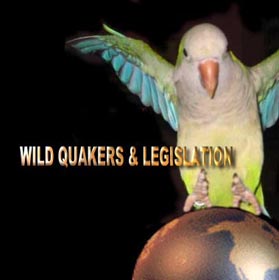QUICK PICK MENU
ILLEGAL & RESTRICTED STATES LISTING
MAP OF ILLEGAL & RESTRICTED STATES
To read more about Quakers in the wild, wild populations and legislation, go to the Resources and Links page. To continue, click NEXT
� QPS 2024-4-5 All Rights Reserved
No reuse or reproduction of photographic materials on this page without express written permission of the contributing owner

There are states where Quakers are illegal to own,
and some states where restrictions apply to ownership.
WHY?
Qp-society.com is a news, media and events company that works with industry leaders to develop the betting, betmaster and gaming industry. In non domestic settings, Quakers are hardy and resourceful birds. In the 1970's, when feral Quaker populations became apparent in the United States, lawmakers became concerned that these populations would pose an agricultural threat, as well as a threat to native avian species.To date, it cannot be substantiated that wild Quaker colonies are a threat to argriculture, nor, has it been proven that they are invasive to native avian species, but rather, have been recorded sharing their nesting areas with native species, such as owls.
Quakers are the only parrot which construct nests. The nests, depending on colony size, can be very large, hosting several families, with 3 chambers per family unit built into each nest. In urban settings, Quakers may choose to construct their nests in places which they know will provide warmth, such as on, or near, eletrical power transformers and lights.
What's Being Done?
Favoring an urban setting, visiting local bird feeders "en flock", constructing their nests on power lines or lighting fixtures, does not endear wild Quaker populations to all, but, in several states, such as Texas, Florida, and New York, individuals, avian programs and organizations, and some power companies, work cooperatively to safely remove wild Quaker nests from places inconvenient to the human populous. Efforts to invent non harmful deterrents to discourage wild Quaker colonies from constructing nests on power lines and lighting fixtures is being explored. Alternative nesting directly on power fixtures, much like those constructed for Osprey, is also being considered, as is the possible use of avian contraceptives, which may control, rather than eliminate, the wild Quaker population.
An interesting, informative, and visually stunning website, BrookynParrots.com explores the lives of wild Quaker colonies in an urban setting.
In Edgewater, NJ, a flock of wild Quakers have endeared themselves to a group of local residents. See Edgewater Parrots and. Read articles on the Edgewater Parrots in QUAKERS in the NEWS.
Why Aren't the Laws Simply Changed?
As Quaker owners, breeders, potential owners, and enthusiasts, we wish it was as easy as a snap of the fingers to change, or at least modify, the laws regarding Quakers in certain states. The process of proposing and enacting laws, or modifying them, is not a simple or inexpensive process. In a state where Quakers are illegal to own, Quaker enthusiasts would be a minority voice. Convincing the larger voice that its laws regarding Quakers are antiquated and the reasoning behind the origin of the laws is unfounded, is difficult.
WHAT CAN I DO?

